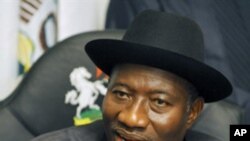West African leaders are calling on Laurent Gbagbo to step down as president of Ivory Coast in favor of a former prime minister who won the United-Nations certified vote.
Nigerian President Goodluck Jonathan chairs the Economic Community of West African States. Following an emergency meeting with the leaders of Burkina Faso, Ghana, Liberia, Mali, Senegal, and Togo, President Jonathan said Mr. Gbagbo should step down because he lost last month's vote.
"The votes of the people must count. Where we have a democracy where the votes do not count, ECOWAS will no longer accept such a pseudo or false democracy," said Jonathan.
President Jonathan says West African leaders agree that former prime minister Alassane Ouattara won the election and is now Ivory Coast's rightful leader. "We reviewed the whole issues, the whole elections, and have come to the conclusion that Ouattara was the person who duly won that election. Of course you know that we no longer accept illegitimate government within the subregion," he said.
So the regional alliance suspended Ivory Coast from all of its activities.
Mr. Gbagbo says he is the president because Ivory Coast's constitutional council annulled as fraudulent nearly ten percent of all ballots cast, giving him 51 percent of the vote. Mr. Ouattara says he is the president because the United Nations certified the original electoral commission results that show him winning 54 percent of the vote.
Both men have named new prime ministers and have the support of rival armed forces. Mr. Gbagbo is supported by senior military officers who control southern regions. Mr. Ouattara is
supported by former rebels who control northern regions.
President Jonathan called on the United Nations and the African Union to work with West African leaders to keep the peace. "We know we have a challenge on our hands. We have two people claiming to be the president. We have two prime ministers. We have two sets of executive councils. And of course that is a very, very abnormal situation. But we believe that we will get over this ugly phase of the history of the subregion," he said.
The first sign of the conflict's regional impact is the arrival of refugees in neighboring Liberia.
Liberian refugee agency official Morris Nelson says more than 600 people have crossed the border into Nimba County since late last week. "At the moment we are building tents where these refugees can seek refuge for the meantime. But what is more alarming is that these Ivorians do not have any food to eat. So we are calling on humanitarian organizations like the WFP (World Food Program) to hurriedly come in to provide support to these Ivorian refugees," he said.
The rebuke by his former colleagues is unlikely to change Mr. Gbagbo's approach to the political crisis. ECOWAS joins the United Nations, the African Union, the European Union, Britain, France, the United States, and Canada in calling for Mr. Gbabgo to yield power.
Mr. Gbagbo dismisses international support for Mr. Ouattara as foreign interference that threatens Ivory Coast's sovereignty. His new prime minister named a new cabinet Tuesday.
President Jonathan says West African leaders want Mr. Gbagbo to yield power without delay because they do not believe a government of national unity is in Ivory Coast's best interests. Given the experience of power-sharing governments in Kenya and Zimbabwe, the Nigerian leader says that does not really work.
West African Leaders Suspend Ivory Coast Over Political Crisis




